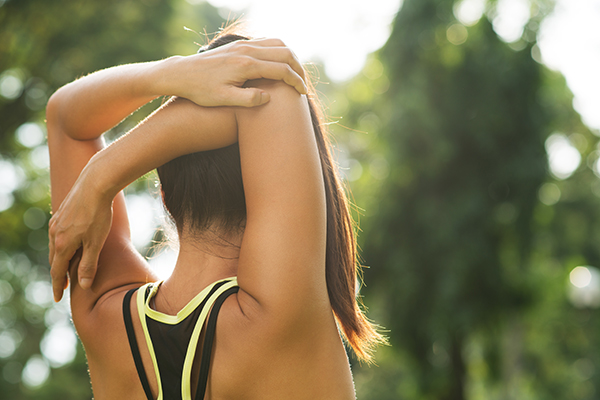Snap, crackle, pop is something you want to hear from your breakfast, not your shoulders. But joints can be fickle, none less than the shoulders, which are the most mobile in the body.
But how to know whether the shoulder popping, clicking, cracking, and crunching experienced during exercise and regular daily movement is cause for concern or just common body clamor?
If there’s pain involved, your first stop is a medical professional. Even in the absence of pain, a chat with your doc is a good idea to help head off any potential problems down the road. Read on for more on the common causes of shoulder clicking.
Why Does My Shoulder Pop?
Cracking and crunching noises can escape from your shoulder for a variety of reasons.
1. Gas pressure
Similar to your knuckles, some shoulders simply crack thanks to “cavitation” — or the act of gas-filled fluid releasing and helping to lubricate the joints. Upon initial movement or repetition during exercise, the joint capsule is stretched, causing a quick-burst release of oxygen, nitrogen, and carbon dioxide gas.
2. Wear and tear
“As we age — or even for those who are more active — the cartilage around our joints can erode,” says Dr. Scott Weiss, D.P.T., C.S.C.S., A.T.C., owner and director of Bodhizone, New York. “Instead of a nice, smooth paved street, it’s kind of like a pothole-laden street. Because things are not smooth, the joints don’t slide easily, which causes a lot of cracking and grating. This can also be a sign of developing arthritis.”
Overuse and repetitive motion can also lead to bursitis or tendinitis. “When you move or rotate your shoulder, the swelling of the bursa or the inflamed tendon can actually rub on the acromion bone, causing you to hear a click or small set of crackling noises in the shoulder,” says Alan M. Reznik, M.D., M.B.A., F.A.A.O.S., chief medical officer at Connecticut Orthopaedic Specialists, associate professor of orthopedics at Yale University School of Medicine, and volunteer for the American Academy of Orthopaedic Surgeons.
3. Body Structure
Your physical build can directly influence bodily movement and, consequently, any resultant noise. For example, some people are naturally loose, or double, jointed. “In certain positions for these body types — especially during weightlifting — the shoulder will partially slide out of the socket, say on a bench press, and then pop back in when bringing the arms back down,” says Reznik.
Or, similar to Weiss’ “potholes” analogy, bones can form speed bumps, too. Weiss explains that in these instances shoulder popping and clicking can result when ligaments and tendons pass over bumps on the bones. This may occur with regular movement, but can also be an indication of body misalignment or muscle weakness. “The stronger the muscles are around the joint the less this happens,” Weiss says.
Other anatomically-related shoulder popping and cracking may be caused by poor posture, rounded shoulders (thanks to an abundance of forward-facing activities of texting and computer use), and muscular imbalances.
4. Unnatural movement
Uncommon patterns of movement can also result in shoulder popping and crunching. “Think about the difference between us and monkeys,” says Reznik. “Monkeys can hang from their arms all day because their shoulders are anatomically different than ours.
“When you start doing exercises where your hands are behind you, such as the butterfly stroke in swimming or overhand pitching in baseball, this unnatural movement often leads to more shoulder popping, as well as pain and injuries over time.”
5. Tight muscles
Shoulder popping and clicking can also be the result of friction caused by muscle rubbing against bone. One example Weiss cites is a tight muscle wrapped around a bony protuberance, which can have a bow-stringing effect that results in a snapping sound. Muscular strengthening and stretching have shown to prevent this pain-free yet repetitive dissonance, according to a study published in Muscles, Ligaments and Tendons Journal.
6. Injury
Shoulder clicking or snapping, be it abrupt or gradual, could be the result of a shoulder injury, such as tears, dislocation, inflammation, or impingement.
When Should I See a Doctor for Shoulder Clicking?
Shoulder popping and clicking with a side of pain and swelling means seeking medical advice is a must. But even if you don’t have shoulder joint pain or swelling, ongoing persistent clicking or popping is still good reason to check in with your doc. A diagnostic X-ray or MRI scan may be needed to determine the root cause and develop a proper treatment plan.
“Sounds that come from the body can mean so many different things,” says Weiss. “It’s important to listen your body and, if something lasts long, get it checked out. Catching it early can prevent a lot of wasting and wearing down of the body. Really, if you see — or hear — something, say something.”
The post Why Is Your Shoulder Popping, Clicking, or Cracking? appeared first on The Beachbody Blog.



0 Comments